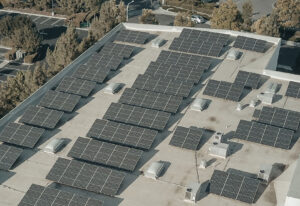Local NC Seafood Company Awarded REAP Grant to Fund Energy-Efficiency Improvements
 Local North Carolina seafood distributor Atlantic Seafood Company was recently awarded a $106,100 grant from the U.S. Department of Agriculture’s 2021 Rural Energy for America Program (REAP), which provides grants and/or loan guarantees to rural small businesses and agricultural producers for renewable energy systems and energy efficiency improvements.
Local North Carolina seafood distributor Atlantic Seafood Company was recently awarded a $106,100 grant from the U.S. Department of Agriculture’s 2021 Rural Energy for America Program (REAP), which provides grants and/or loan guarantees to rural small businesses and agricultural producers for renewable energy systems and energy efficiency improvements.
Atlantic Seafood Company is constructing a new office and distribution center in Holly Ridge, Onslow County, North Carolina, and grant funds will support the replacement of aging refrigeration equipment with new, energy efficient equipment. The NC Clean Energy Technology Center (NCCETC) supported Atlantic Seafood during the application process for the REAP grant, providing technical assistance and completing an energy audit for the program’s required energy efficiency and savings analysis.
“We’re committed to meeting the growing demand in the seafood industry, and the REAP grant will support this goal,” Atlantic Seafood’s Alena Smith said. “Atlantic Seafood will use funds to help construct a larger, more efficient refrigerated warehouse with the capacity to maintain freshness and preserve the quality of the seafood.”
 Located in Pender County, NC, the Smith family first opened Atlantic Seafood Company in 1964 and continues to invest in the economy of southeastern North Carolina. The company is developing a new larger facility in Holly Ridge, Onslow County, ensuring job security for local fishermen by being a stable presence in the seafood industry throughout the COVID-19 pandemic and beyond. The operation has been family owned and operated 7 days a week, with 49 total employees and average annual sales over $30 million.
Located in Pender County, NC, the Smith family first opened Atlantic Seafood Company in 1964 and continues to invest in the economy of southeastern North Carolina. The company is developing a new larger facility in Holly Ridge, Onslow County, ensuring job security for local fishermen by being a stable presence in the seafood industry throughout the COVID-19 pandemic and beyond. The operation has been family owned and operated 7 days a week, with 49 total employees and average annual sales over $30 million.
A key part of their successful business model is the company’s capability to store fresh and frozen seafood in the refrigerators, coolers and freezers at their two existing facilities in large quantities. These facilities are being consolidated to the new Holly Ridge location and the REAP grant will help replace the old cold storage refrigeration equipment, the oldest of which dates back to 1983, with equipment that is more reliable and reduces overall energy consumption.
NCCETC’s Assistant Director for Technical Services for the Clean Power & Industrial Efficiency (CPIE) program, Isaac Panzarella, conducted the energy audit by comparing the equipment currently used in Atlantic Seafood’s existing locations to the new refrigeration equipment with lower horsepower (HP) ratings proposed by the seafood distributor. Three proposed energy-efficiency improvements were evaluated in the audit:
- Installing a new freezer (-10 deg F) with a 60 HP rating replacing the existing 80 HP freezer.
- A new cooler (30 deg F) rated at 12 HP replacing the existing 15 HP cooler.
- A new ice machine with 30 HP rating replacing the existing 40 HP machine.
Based on the comparison of the baseline energy consumption and cost to that of the proposed replacements, the audit findings determined that the proposed new equipment would produce an energy savings of 643,427 kWh, representing a 57 percent reduction in electricity consumption, yielding an annual savings of approximately $40,000. Additionally, the consolidated facility will be equipped with compression seals, door curtains and a high-performance building envelope to allow temperatures to remain consistent, creating optimal performance conditions for the new refrigeration system and resulting in additional energy and operational cost savings.
Generator back-up and renewable energy solutions such as solar panels have also been incorporated into the warehouse to increase resiliency in the event of catastrophes. Emergency power systems that provide back-up power during outages will protect the freezer and cooler equipment with a combined capacity of 2.1 million pounds of seafood.
Atlantic Seafood first partnered with the NCCETC to analyze the potential for installing a photovoltaic (PV) solar array on the new warehouse. “The solar feasibility study provided recommendations to Atlantic Seafood for implementing a rooftop solar PV system to enhance resiliency and reduce the facility’s carbon footprint and electric bill,” said Art Samberg, CPIE Program Director at NCCETC.
 NCCETC’s solar PV analysis also included information on optimal rooftop PV installation design and characteristics such as different types of solar racking systems, inverters, system data acquisition and monitoring, safety and disconnecting means, and operations and maintenance of the PV systems.
NCCETC’s solar PV analysis also included information on optimal rooftop PV installation design and characteristics such as different types of solar racking systems, inverters, system data acquisition and monitoring, safety and disconnecting means, and operations and maintenance of the PV systems.
To support the analysis and reduce its economic burden, several funding opportunities and available grants were identified and outlined. The identified funding programs are aimed at supporting businesses like Atlantic Seafood that bolster rural communities and provide resources during emergency situations.
NCCETC identified two relevant incentives available to the seafood company: the federal investment tax credit which provides the owner with a tax credit for 26 percent of the total installed cost of solar energy systems and a competitive solar rebate offered by Duke Energy, which provides a rebate of $0.30/Watt up to a maximum of $30,000. Additionally, the USDA funds grants and loan guarantees for renewable energy systems at rural small businesses and agricultural producers.
“Being able to assist a business in the process of expanding allows us to help them integrate sustainability, resiliency and energy cost savings into their future operations ” said Samberg. Atlantic Seafood’s new location is expected to open in 2022.
“Atlantic Seafood distributes around 275,000 pounds of over 70 difference species of fish and shellfish each week,” Smith said. “With quality and storage capacity increasing, we’ll be able to better serve our local communities from one location.”
ABOUT THE NC CLEAN ENERGY TECHNOLOGY CENTER
Founded in 1987, the NCCETC advances a sustainable energy economy through its programs and activities to promote the development and use of clean energy technologies. Business and citizens of North Carolina and beyond can benefit from the NCCETC’s services and resources.
The NCCETC helps large industrial, institutional and commercial energy users reach their energy-related goals by educating, demonstrating and providing support for clean energy technologies, practices and policies. The CPIE program at the Center is staffed by experienced specialists and engineers with experience helping clients improve energy efficiency of buildings systems and / or industrial processes.